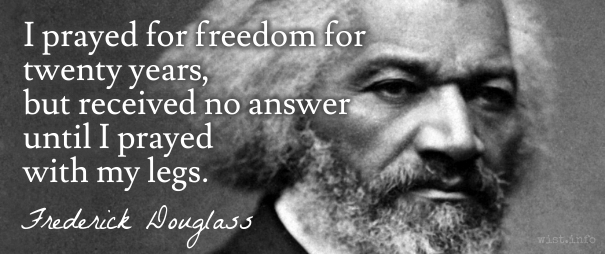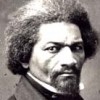May I join you in the doghouse, Rover?
I wish to retire till the party’s over.Ogden Nash (1902-1971) American poet
“Children’s Party,” ll. 1-2, Many Long Years Ago (1945)
(Source)
Quotations about:
escape
Note not all quotations have been tagged, so Search may find additional quotes on this topic.
At long last, citizens, Lucius Catilina, blazing with insolence, breathing forth blasts of every audacious rascality, outrageously plotting to overthrow his country, menacing yourselves and our city with fire and sword, has been expelled from Rome by our action, or allowed to leave, or bidden farewell as he took his departure. Gone, retired, run away, broken out, express it how you will.
[Tandem aliquando, Quirites, L. Catilinam, furentem audacia, scelus anhelantem, pestem patriae nefarie molientem, vobis atque huic urbi ferro flammaque minitantem ex urbe vel eiecimus vel emisimus vel ipsum egredientem verbis prosecuti sumus. Abiit, excessit, evasit, erupit.]
Marcus Tullius Cicero (106-43 BC) Roman orator, statesman, philosopher
Orationes in Catilinam [Catilinarian Orations], No. 2, § 1, cl. 1 (2.1.1) (63-11-09 BC) [tr. Grant (1960)]
(Source)
Informing the Senate that Catiline and many of his co-conspirators had fled Rome the day before.
(Source (Latin)). Alternate translations:
At last with much ado, have we either expelled, or let out, or else waited upon L. Catiline of himself, going out of Town, foaming with rage, breathing Treason, unnaturally plotting the destruction of his Countrey, and menacing you and this City with Fire and Sword. He is gone, he is got his way, he is escaped, he is broke loose.
[tr. Wase (1671)]
At length, my fellow-citizens, Lucius Catiline, that nefarious traitor, burning with frantic fury, breathing vengeance and destruction; that public enemy, who meditated the ruin of his country, and threatened this city with sword and fire; that monster of iniquity has sounded his retreat. He is gone; he is fled; he has escaped; he has disappeared.
[tr. Sydney (1795)]
At length, O Romans, we have dismissed from the city, or driven out, or, when he was departing of his own accord, we have pursued with words, Lucius Catiline, mad with audacity, breathing wickedness, impiously planning mischief to his country, threatening fire and sword to you and to this city. He is gone, he has departed, he has disappeared, he has rushed out.
[tr. Yonge (1856)]
At length, at last, oh Romans! we have either cast out of the city Lucius Catiline, raging with audacity, panting after crime, impiously attempting the destruction of our native land, threatening you and this city with sword and with flame, or we have sent him forth, or we have followed with words him when going out. He has gone away, he has departed, he has escaped, he has burst forth.
[tr. Mongan (1879)]
At length, Romans, either we have cast out of the city, L. Catiline, raging with audacity, panting after crime, attempting nefariously the pest (destruction) of the country, threatening sword and flame to you and to this city, or we have sent (him) out, or we have followed with words himself going out. He has departed, he has gone out, he has escaped, he has burst out.
[tr. Underwood (1885)]
At length, finally, Romans, L. Catiline, raging with insolence, breathing out crime, attempting impiously the ruin of the country, threatening sword and flame to you and to this city, either we have cast out of the city, or we have sent (him) out, or with words we have followed him going himself. He has departed, he has gone forth, he has escaped, he has burst out.
[tr. Dewey (1916)]
He is gone, he has fled, he has eluded our vigilance, he has broken through our guards.
[Source]
Wedlock, as old Men note, hath likened been,
Unto a publick Crowd or common Rout;
Where those that are without would fain get in,
And those that are within would fain get out.
You think when you wake up in the mornin yesterday dont count. But yesterday is all that does count. What else is there? Your life is made out of the days it’s made out of. Nothin else. You might think you could run away and change your name and I dont know what all. Start over. And then one mornin you wake up and look at the ceilin and guess who’s layin there?
Cormac McCarthy (1933-2023) American novelist, playwright, screenwriter
No Country for Old Men (2005)
(Source)
Still, what I want in my life
is to be willing
to be dazzled —
to cast aside the weight of facts
and maybe even
to float a little
above this difficult world.
To drink for pleasure may be a distraction, but to drink from misery is always a danger.
Art and Religion are, then, two roads by which men escape from circumstance to ecstasy.
No shame in running,
fleeing disaster, even in pitch darkness.
Better to flee from death than feel its grip.[Οὐ γάρ τις νέμεσις φυγέειν κακόν, οὐδ’ ἀνὰ νύκτα.
βέλτερον ὃς φεύγων προφύγῃ κακὸν ἠὲ ἁλώῃ.]Homer (fl. 7th-8th C. BC) Greek author
The Iliad [Ἰλιάς], Book 14, l. 80ff (14.80) [Agamemnon] (c. 750 BC) [tr. Fagles (1990), l. 96ff]
(Source)
Original Greek. Alternate translations:
Better from evils, well foreseen, to run
Than perish in the danger we may shun.
[tr. Pope (1715-20)]
For there is no disgrace in flying from evil, not even during the night. It is better for a flying man to escape from evil, than to be taken.
[tr. Buckley (1860)]
For there is no shame in fleeing from ruin, yea, even in the night. Better doth he fare who flees from trouble, than he that is overtaken.
[tr. Leaf/Lang/Myers (1891)]
There is nothing wrong in flying ruin even by night. It is better for a man that he should fly and be saved than be caught and killed.
[tr. Butler (1898)]
There is no shame in running, even by night, from disaster.
The man does better who runs from disaster than he who is caught by it.
[tr. Lattimore (1951)]
There's no disgrace in getting away from ruin, not by a night retirement. Better a man should leave the worst behind him than be caught.
[tr. Fitzgerald (1974)]
Dreams, books, are each a world; and books we know,
Are a substantial world, both pure and good:
Round these, with tendrils strong as flesh and blood,
Our pastime and our happiness will grow.
History is crowded with the persons who have exchanged a life of dismay for death. Lucius Aruntius killed himself, he said, to escape from both the future and the past.
[L’Histoire est toute pleine de ceux qui en mille façons ont changé à la mort une vie peneuse. Lucius Aruntius se tua, pour, disoit-il, fuir et l’advenir et le passé.]
Michel de Montaigne (1533-1592) French essayist
Essays, Book 2, ch. 3 “A Custom of the Island of Cea [Coustume de l’Isle de Cea]” (c. 1573) (2.3) (1595) [tr. Ives (1925)]
(Source)
The reference to Lucius Aruntius, who killed himself during the waning days of Tiberius' reign before he could, like other enemies of Tiberius, be imprisoned and executed, was added in the 1588 edition. The event is described in Tacitus, Annals, Book 6, sec. 48.
(Source (French)). Alternate translations:
The historie is very full of such, who a thousand wayes have changed a lingering-toylsome life with death. Lucius Aruntius killed himselfe (as he saide) to avoyde what was past, and eschew what was to come.
[tr. Florio (1603)]
History abounds with instances of persons that have in a thousand forms, exchanged a melancholy life for death. Lucius Aruntius killed himself for the sake, as he said, of flying from deeds past and to come.
[tr. Cotton (1686), Vol. 1, ch. 60]
History is everywhere full of those who by a thousand ways have exchanged a painful and irksome life for death. Lucius Aruntius killed himself, to fly, he said, both the future and the past.
[tr. Cotton/Hazlitt (1877)]
History is chock full of those who in a thousand ways have changed a painful life for death. Lucius Arruntius killed himself, he said, to escape both the future and the past.
[tr. Frame (1943)]
History is full of people who have, in thousands of ways, exchanged a pain-filled life for death. Lucius Aruntius killed himself, "to escape," he said, "from the future and the past."
[tr. Screech (1987)]
I prayed for freedom for twenty years, but received no answer until I prayed with my legs.
The desire for safety stands against every great and noble enterprise.
[Nisi impunitatis cupido retinuisset, magnis semper conatibus adversa.]
GONZALO: Beseech you, sir, be merry. You have cause —
So have we all — of joy, for our escape
Is much beyond our loss. Our hint of woe
Is common; every day some sailor’s wife,
The masters of some merchant, and the merchant
Have just our theme of woe. But for the miracle —
I mean our preservation — few in millions
Can speak like us. Then wisely, good sir, weigh
Our sorrow with our comfort.William Shakespeare (1564-1616) English dramatist and poet
Tempest, Act 2, sc. 1, l. 1ff (2.1.1-9) (1611)
(Source)















